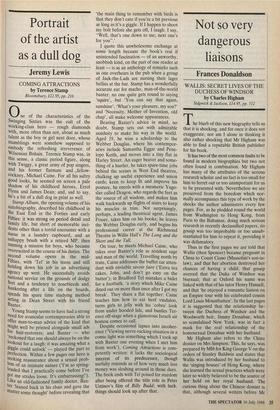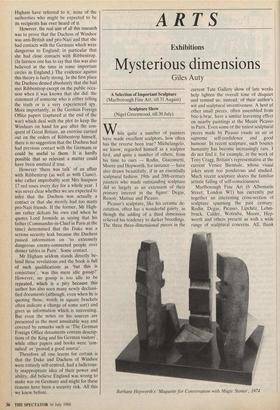Not so very dangerous liaisons
Frances Donaldson
WALLIS: SECRET LIVES OF THE DUCHESS OF WINDSOR by Charles Higham
Sidgwick & Jackson, £14.95, pp. 512
The blurb of this new biography tells us that it is shocking, and for once it does not exaggerate; nor am I alone in thinking it also rather shocking that Mr Higham was able to find a reputable British publisher for his book.
It has two of the most common faults to lx found in modern biographies but two not often found in combination. Mr Higham has many of the attributes of the serious research scholar and no fact is too small for him to ferret out or too unimportant for us to be presented with. Nevertheless we are preserved from the boredom which nor- mally accompanies this type of work by the shocks the author administers every few pages. For, as he plodded round the world from Washington to Hong Kong, from Paris to the Bahamas, doing much serious research in recently declassified papers, no gossip was too improbable or too unsub- stantiated for him to repeat it, providing it was defamatory.
Thus in the first pages we are told that Wallis (then Spencer) became pregnant in China to Count Ciano (Mussolini's son-in- law), and that her abortion destroyed her chances of having a child; that gossip averred that the Duke of Windsor was bisexual; that at Oxford his name was linked with that of his tutor Henry Hansell, and that 'he enjoyed a romantic liaison on an Empire tour with his celebrated cousin Lord Louis Mountbatten'. In the last pages it is suggested that the relationship be- tween the Duchess of Windsor and the Woolworth heir, Jimmy Donahue, which so scandalised New York, was in fact a mask for the real relationship of the homosexual Donahue with her husband.
Mr Higham also refers to the China dossier on Mrs Simpson. This, he says, was prepared by MI6 for King George V on the orders of Stanley Baldwin and states that Wallis was introduced by her husband to the 'singing houses' of Hong Kong, where she learned the sexual practices which were later so widely believed to be the source of her hold on her royal husband. The curious thing about the Chinese dossier is that, although several writers before Mr Higham have referred to it, none of the authorities who might be expected to be its recipients has ever heard of it.
However, the real aim of all this research was to prove that the Duchess of Windsor was anti-British and pro-Nazi and that she had contacts with the Germans which were dangerous to England; in particular that she had close contacts with Ribbentrop. (In fairness one has to say that this was also believed at the time in some important circles in England.) The evidence against this theory is fairly strong. In the first place the Duchess denied absolutely that she had met Ribbentrop except on the public occa- sion when it was known that she did: the statement of someone who is either telling the truth or is a very experienced spy. More importantly, in the German Foreign Office papers (captured at the end of the war) which deal with the plot to keep the Windsors on hand for pse after the con- quest of Great Britain, an exercise carried out on the orders of Ribbentrop himself, there is no suggestion that the Duchess had had previous contact with the Germans or could be useful to them. It is hardly possible that so relevant a matter could have been omitted if true.
However 'there was talk' of an affair with Ribbentrop (as well as with Ciano), who rather improbably sent Mrs Simpson 17 red roses every day for a whole year. I was never clear whether we are expected to infer that the Duchess was actually a contact or that she merely had too many pro-Nazi friends. If the former, Mr High- am rather defeats his own end when he quotes Lord Ironside as saying that his father (Commander-in-Chief in Paris at the time) determined that the Duke was a serious security leak because the Duchess passed information on `to extremely dangerous enemy-connected people over dinner tables in Paris'. Some contact.
Mr Higham seldom stands directly be- hind these revelations and the book is full of such qualifications as 'but this is conjecture', 'was this mere idle gossip?' However, no gossip is too idle to be repeated, which is a pity because this author has also seen many newly declassi- fied documents (although, even when he is quoting these, words in square brackets often indicate a change of some sort) and gives us information which is interesting. But even the notes on his sources are presented in the most unsuitable way and covered by remarks such as 'The German Foreign Office documents contain descrip- tions of the King and his German visitors'. while other papers and books were 'con- sulted' or 'proved a good source'.
Therefore all one learns for certain is that the Duke and Duchess of Windsor were entirely self-centred, had a ludicrous- ly inappropriate idea of their power and ability, did believe England was wrong to make war on Germany and might for these reasons have been a security risk. All this we knew before.



















































 Previous page
Previous page